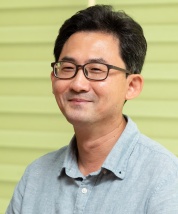Red Diary
Two years ago, Myanmar’s military staged a coup, and the people resisted. The story of a couple fighting for democracy in Myanmar.
One day, Choi Jin-bae receives photos and videos from Myanmar. After volunteering in Myanmar five years ago, Choi returned to South Korea to work as a translator when he received news from Myanmar after a long silence. The photos he received show a devastated neighborhood, bloodied stairs, and collapsed houses. The people of Myanmar asked him to inform the world about what was happening in their country. While studying and working in Korea, Myanmar national Nyein Thazin receives news of a coup in her homeland. She immediately worries about her family in Mandalay. She calls her father and he tells her about the military’s brutality in real time. The photos she received depict a devasted neighborhood, blood-soaked stairs, and collapsed houses. The people of Myanmar have asked to inform the world what was happening in their country. Eventually, Choi Jin-bae and Nyein Thazin start their own democratization struggle to help Myanmar. The film is based on the protagonists’ own diaries and follows the people’s struggle for democratization in Myanmar and the atrocities committed by the military along with footage secretly shot by local citizens.
In February 2021, Myanmar’s military junta staged a coup, detaining State Counselor Aung San Suu Kyi and politicians, claiming that a general election held three months ago was illegitimate. The people of Myanmar believe that their country should no longer return to the military dictatorship of its past, so they engage in peaceful protests and civil disobedience, but the military tramples on those who demand democracy. Two years later, the people of Myanmar are still fighting for democracy, refusing to give up even in the face of the guns of the military. I saw the footage that Jinbae Choi kept, the protagonist of the film, most of which was secretly filmed by the people of Myanmar at the risk of their lives, and it showed the people’s painstaking resistance to restore democracy and the military’s atrocities to maintain power. I made this work to support the revolution for democracy in Myanmar, which has been overshadowed by many issues.

(54999) 2F, JEONJU Cine Complex, 22, Jeonjugaeksa 3-gil, Wansan-gu, Jeonju-si, Jeonbuk-do, Republic of Korea
T. +82 (0)63 288 5433 F. +82 (0)63 288 5411
(04031) 4F, 16, Yanghwa-ro 15-gil, Mapo-gu, Seoul, Republic of Korea
T. +82 (0)2 2285 0562 F. +82 (0)2 2285 0560
(54999) JEONJU Cine Complex, 22, Jeonjugaeksa 3-gil, Wansan-gu, Jeonju-si, Jeonbuk-do, Republic of Korea
T. +82 (0)63 231 3377
Privacy PolicyTerms of service
COPYRIGHT © JEONJU International Film Festival ALL RIGHTS RESERVED (M2)